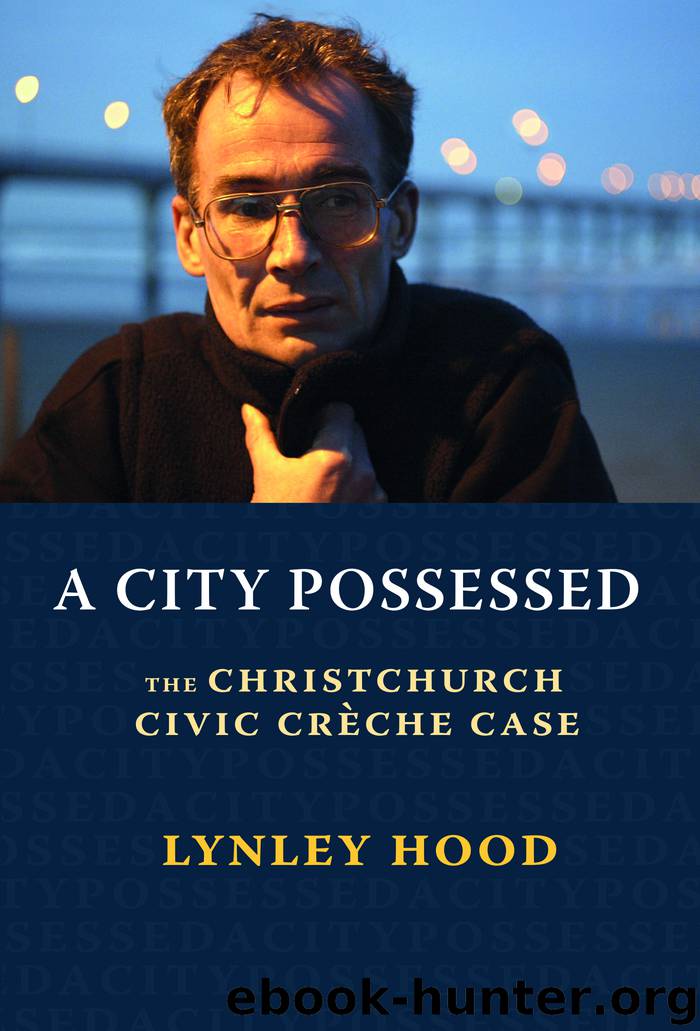A City Possessed by Lynley Hood

Author:Lynley Hood
Language: eng
Format: epub
Publisher: Otago University Press
Published: 2019-11-16T16:00:00+00:00
8.ii: A Sustained Campaign of State-Funded Contamination of the Evidence
In an interview with TV3 journalist Melanie Reid in April 1993, Peter Ellis looked back over his year awaiting trial. ‘This may sound potty, but my life is sort of the same,’ he said. ‘I get up. I have breakfast. I feed my animals. I go to my supermarket, my pet shop, they ask me how it’s going. I don’t have to worry about not being served. I don’t have to run in and out. No one has called me names. The neighbours look out for me.’1
By then, Ellis had received anonymous death threats and a bullet in the mail. He had been beaten up by skinheads. In his interview with Reid he brushed aside those events as isolated incidents, but admitted to being constantly on guard, especially when he left the house.
Ellis could not drive and had never owned a car. He rarely went out during the day. His bail conditions kept him home between 7pm each evening and 7am next morning. When he reported to the police station, his mother usually drove him. When he viewed children’s videotaped interviews at the Child Abuse Unit, he got a ride with his barrister Rob Harrison. When he went beyond his own neighbourhood for any other reason, he usually caught a bus. He tried to avoid public places. Walking was an ordeal.
‘If I’m out walking and a toddler appears, I think: I’ve got to cross the road. There’s a child, I don’t want to be anywhere near it. I don’t know who’s going to suddenly point a finger and say, “He’s been near my child,’” he told Reid.2
Between his first court appearance on 31 March 1992 and his second on 14 April, Ellis and his barrister fell into a pattern that would be repeated many times over in the coming months. Whenever Detective Eade was ready to lay more charges he would arrange for Ellis and Harrison to view the relevant videotapes. Then he would interview Ellis in Harrison’s presence about the allegations they contained. After each burst of videotape viewing, Ellis would make another court appearance, and more charges would be laid against him.
On 1 and 3 April, Ellis and Harrison viewed the videotapes of interviews with Lara Palm and Kari Lacebark. On 14 April, Ellis was charged with five offences relating to the two girls. At the same time his name suppression was lifted.
From then on, the media was free to publish images of Ellis. But, lest anxious parents use newspaper photographs or television footage of Peter Ellis ‘to help their children remember’, Rob Harrison kept his client well away from the journalists and photographers that invariably surrounded the courthouse.
On 5, 7 and 8 June, Ellis and Harrison viewed the videotapes of Eli Laurel, Molly Sumach and Zelda Cypress. In the morning of 9 June, Ellis was charged with five offences relating to those children. In the afternoon of the same day Harrison’s professionalism towards the media was put to
Download
This site does not store any files on its server. We only index and link to content provided by other sites. Please contact the content providers to delete copyright contents if any and email us, we'll remove relevant links or contents immediately.
Mindhunter: Inside the FBI's Elite Serial Crime Unit by John E. Douglas & Mark Olshaker(9346)
Wiseguy by Nicholas Pileggi(5791)
Room 212 by Kate Stewart(5129)
Hitman by Howie Carr(5099)
Secrecy World by Jake Bernstein(4755)
Killers of the Flower Moon: The Osage Murders and the Birth of the FBI by David Grann(4449)
Papillon (English) by Henri Charrière(4277)
Breaking Free by Rachel Jeffs(4220)
Killers of the Flower Moon by David Grann(4060)
Say Nothing by Patrick Radden Keefe(3990)
American Kingpin by Nick Bilton(3891)
The Secret Barrister by The Secret Barrister(3713)
Molly's Game: From Hollywood's Elite to Wall Street's Billionaire Boys Club, My High-Stakes Adventure in the World of Underground Poker by Molly Bloom(3540)
Mysteries by Colin Wilson(3457)
In Cold Blood by Truman Capote(3388)
Signature in the Cell: DNA and the Evidence for Intelligent Design by Stephen C. Meyer(3140)
I'll Be Gone in the Dark by Michelle McNamara(3085)
Rogue Trader by Leeson Nick(3047)
Bunk by Kevin Young(3004)
